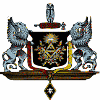Livros, Monitores...
Postado Segunda-feira, 18 Maio, 2009 as 10:02 AM pelo Ir:. Angelo Andres Maurin Cortes
![]() A seguir uma lista de livros interessantes assim como os monitores do
Cap. Morgan, Duncan´s e da Grande Loja de Texas.
A seguir uma lista de livros interessantes assim como os monitores do
Cap. Morgan, Duncan´s e da Grande Loja de Texas.
Ancient Craft Masonry - Freemasonry
Ancient Craft Masonry refers to the first three degrees of Freemasonry. It is the world's oldest and largest fraternal organization. It is known by many names: Freemasonry, Masonry, the Blue Lodge, Symbolic Masonry or simply as "the Craft." Ancient Craft Masonry is comprised of three degrees: Entered Apprentice, Fellow Craft and Master Mason.
Freemasonry is often described as a peculiar system of morality veiled in allegory and illustrated by symbols. The aim of the Craft is to make good men better with a special form of instruction from ancient rituals. Most of the symbols used in these rituals derive from the working tools of operative masons from the middle ages and teach the speculative masons moral lessons. The brotherhood of masonry is joined together by the ideals of a moral and metaphysical nature.
There is also an esoteric side of Ancient Craft Masonry. Many of the symbols presented to initiates of the Craft Lodges are not operative masonry tools. These other symbols have an exoteric meaning as presented in the ritual but many of these symbols have a hidden meaning. It is up to the initiate to search out the esoteric symbolism of the Craft. Appendant rites such as the Scottish Rite or the York Rite claim to help Master Masons search for a deeper understanding of the first three degrees of Masonry, Some of the symbolism in Craft Masonry originates in the ancient mystery traditions of the world. Hermetic Philosophy, Kaballah, and Alchemy, for example, share many of the same symbols as Freemasonry.
The
Dionysian Artificers
by Hippolyto
Joseph da Costa [1820]
An
essay by one of the pioneers of Freemasonry on an important ancient
mystery religion.
Illustrations
of Masonry
by William
Morgan [1827]
An
early 19th century account of Freemasonry which inspired a great deal of
controversy.
Duncan's
Masonic Ritual and Monitor
by Malcolm
C. Duncan [1866]
A
comprehensive guide to York rite Freemasonry,
including details of ceremonies, grips and passwords, extensively
illustrated.
General
Ahiman Rezon
by Daniel
Sickels [1868]
One
of the most sought-after Masonic collections,
with descriptions of ceremonies, hymns, building dedications, funerals,
and more.
Morals
and Dogma
by Albert
Pike [1871]
Albert
Pikes' magnum opus; a advanced textbook of the esoteric basis of
Freemasonry.
Devil
Worship in France
by A.E.
Waite [1882]
Waite
debunks the notorious Taxil hoax which falsely accused Freemasons of
worshipping the Devil.
The
Symbolism of Freemasonry
by Albert
G. Mackey [1882]
Shibboleth:
A Templar Monitor
by George
Cooper Connor [1894]
A
Masonic organization modeled after the Templars of old
The
Builders
by Joseph
Fort Newton [1914]
One
of the most readable introductions to Masonic history and philosophy,
including (for once) a factual account of how Freemasonry emerged in the
18th century.
The
Meaning of Masonry
by W.
L. Wilmshurst [1922]
A
look inside the symbolism of Masonry.
The
Official Monitor of the Grand Lodge of Ancient Free and Accepted Masons,
State of Texas
[1922]
Details
of important Masonic rituals, including
initiations for the first three degrees, installation of a lodge, and a
Masonic burial service.
The Entered Apprentice Degree Ritual - Nevada
The Fellow Craft Degree Ritual
The Masonic rituals provided here are as practiced under the jurisdiction of the Grand Lodge of Nevada, circa 1986.
<Categoria Artigos (RSS), Public.Int (RSS)


